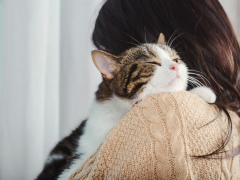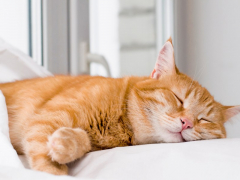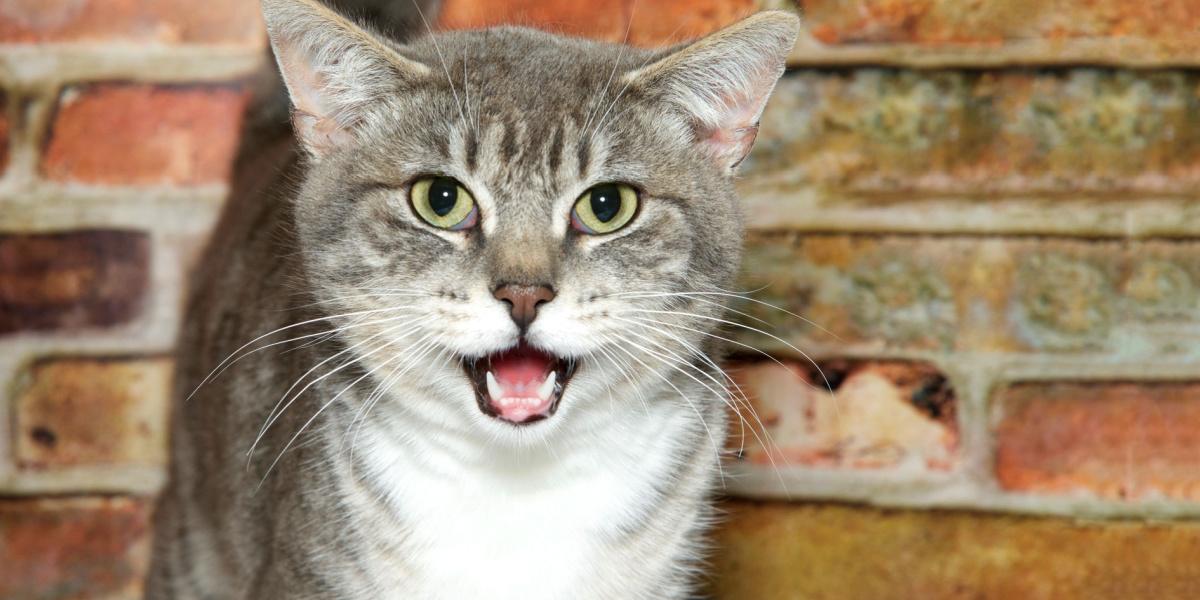
Laryngitis in cats occurs when your cat’s larynx—their voice box or vocal cords—becomes inflamed and sore. Often, the first thing you notice is a change in your cat’s meow (they may even lose their voice!), as well as other signs of a sore throat, such as a dry cough.
Laryngitis can occur on its own, but it is also often a part of an underlying condition, such as an upper respiratory infection. The range of symptoms your cat shows will depend on what is causing their larynx to become inflamed.
You may notice that your cat is quieter than normal, particularly if they are usually very vocal. Just like us, when cats have laryngitis, they can quite literally lose their voice!
Clinical signs that your cat may be suffering from laryngitis include:
- Change in your cat’s voice
- Loss of voice
- Dry cough
- Lowered head position
- Difficulty swallowing
- Loss of appetite
- Fever
- Noisy breathing
- Open mouth
- Less active than normal
- Bad breath
If your cat’s laryngitis is being caused by an upper respiratory infection, you may also notice:
- Runny or red eyes
- Runny nose
- Sneezing
What Causes Laryngitis in Cats?

If your cat spends much of their day meowing to you, it shows you how much they enjoy verbally communicating with you.
Like sore throats in people, the underlying cause of laryngitis in cats can be hard to determine.
Although often just a sign of a mild cat cold, common causes of laryngitis include:
- Upper respiratory infections (such as feline herpesvirus or feline calicivirus)
- Excessive meowing
- Inhaled irritants, such as smoke, dust or chemicals
- Allergic reactions
- Growth or tumors in the throat (including benign growths, throat cancer or feline eosinophilic granuloma complex)
- Foreign object in the throat causing a blockage
- Laryngeal paralysis
- Hyperthyroidism (an overactive thyroid)
- Trauma
- Irritation following a breathing tube during anaesthesia
How Do You Diagnose Laryngitis in Cats?
If you notice signs of laryngitis in your cat, you should take them to see your veterinarian. If your cat’s symptoms are mild, your veterinarian may suspect a diagnosis of laryngitis on the basis of their physical examination and history alone.
However, sometimes it may be necessary to perform further tests to get a more definitive diagnosis. This might include:
- Blood tests
- Swabs of the nose, throat or eyes for infectious causes
- X-rays of the throat and chest
- Direct visualisation of the larynx using an endoscope (laryngoscopy)
How Do You Treat Laryngitis in Cats?
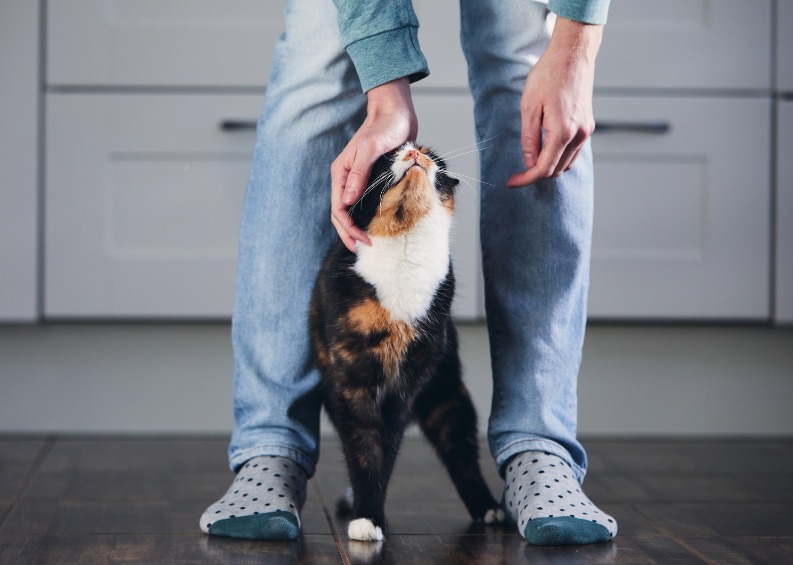
The best way to learn to speak meow to your cat is by closely observing them.
Once your veterinarian has made a diagnosis of laryngitis, they will discuss a treatment plan. This will vary depending on the severity of the laryngitis, and the underlying cause of the inflammation of the larynx.
In simple cases of mild laryngitis in cats no specific treatment may be advised other than rest and some TLC at home. When your cat’s throat is sore, dry, cold air can make this even more uncomfortable. You can create a warm, humid environment for them by allowing them into the bathroom while you run a hot bath or shower.
Soft, wet food may be easier for your cat to swallow when they have a sore throat, however, make sure you introduce any dietary changes gradually to avoid a tummy upset. If your cat also has a runny nose, make sure to keep this clean (if they let you!) to help them breathe more easily and smell their food.
In more severe cases of laryngitis, your veterinarian may recommend medications, such as anti-inflammatories, corticosteroids, diuretics or antibiotics if a bacterial infection is suspected. If a blockage or mass is suspected in your cat’s larynx, your veterinarian may recommend surgery to remove this.
Do Cats With Laryngitis Recover?
The good news is, most cases of laryngitis in cats are mild and can be treated with home care alone, or medication prescribed by a veterinarian. These cases usually make a full recovery within a few days to a week.
Sometimes, the underlying cause of laryngitis is more serious, such as throat cancer or a foreign body. In these cases, recovery will be longer and more difficult, and in rare cases a full recovery may not be possible.
Early diagnosis and treatment by your veterinarian will give your cat the best opportunity for a full recovery, so if you are worried your cat may have laryngitis, take them to your veterinarian as soon as possible.
Can You Prevent Laryngitis in Cats?
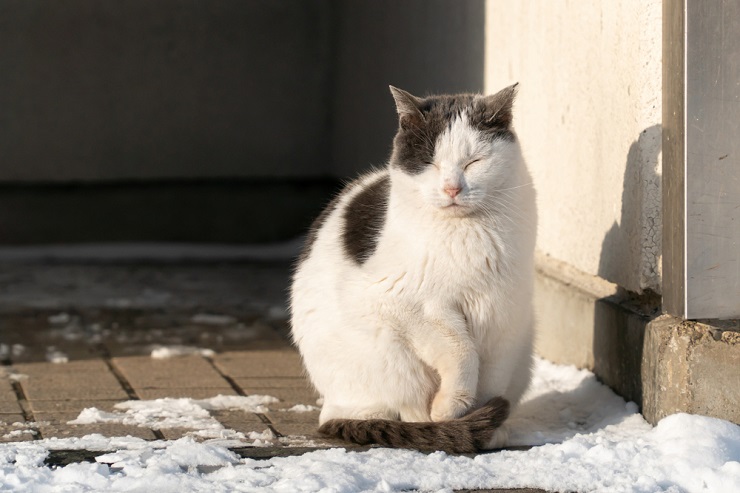
If your cat’s laryngitis is being caused by an upper respiratory infection, your vet may prescribe medications.
It can be tricky to prevent laryngitis in cats—just like it can be hard for humans to avoid ever catching a cold. However, ensuring your cat has a healthy, balanced diet and is up to date with their vaccinations will help to keep their immune systems as strong as possible.
You can also reduce possible irritation to your cat’s airway by reducing smoking, dust, aerosols and other chemicals in their environment.
In Review
Just like sore throats in people, laryngitis is common in cats and usually only causes mild signs of illness, such as a change in their meow. Laryngitis in cats can occur on its own, or as part of an underling condition, such as an upper respiratory infection.
The good news is that the vast majority cats with laryngitis will make a full recovery within a few days with just simple home care or some medication prescribed by your veterinarian, such as an anti-inflammatory.
Occasionally, laryngitis can be caused by something much more serious. Therefore, if you notice any signs of laryngitis in your cat, you should take them for an examination with your veterinarian.
Frequently Asked Questions
How long does laryngitis usually last?
Most cases of mild laryngitis in cats clear up within a few days to a week with just rest and home care, or some medication prescribed by your veterinarian, such as an anti-inflammatory pain relief. If the underlying cause of laryngitis is something more serious (such as a foreign body in the throat or a tumor), treatment may required more invasive treatment, such as surgery. In these cases, recovery may take a lot longer.
Will laryngitis go away by itself?
Like sore throats in people, some cases of laryngitis in cats do get better on their own within a few days with some rest and TLC at home. However, moderate to severe cases of laryngitis may require medication prescribed by your veterinarian to resolve.
Symptoms of laryngitis can sometimes be a sign of a more serious underlying condition in your cat, and therefore we would always recommend that you take your cat for an examination with your veterinarian if they are showing symptoms of laryngitis.
Why is my cat's meow suddenly hoarse?
If you notice a sudden change in your cat’s meow—or they even lose their voice completely—this can be a sign of laryngitis. Laryngitis occurs when your cat’s larynx (the voice box or vocal cords) becomes inflamed, just like a sore throat in people. There are lots of reasons why laryngitis occurs, from something as simple as a cat cold, to more serious conditions, such as throat cancer.
How can I soothe my cat's throat?
Keeping the air warm and humid can help to soothe your cat’s sore throat. You can buy humidifiers, but a simple and effective method is running a hot bath or shower in the bathroom and letting your cat relax in there with the door shut. You can also help reduce irritation in your cat's throat by reducing dust, chemicals, smoking or aerosols in your cat’s environment.
Soft, wet food may be easier and more appealing for your cat to eat when they have a sore throat but do make sure you introduce any changes in their diet gradually to reduce the chance of a tummy upset.






